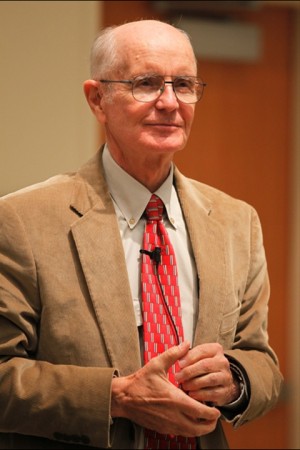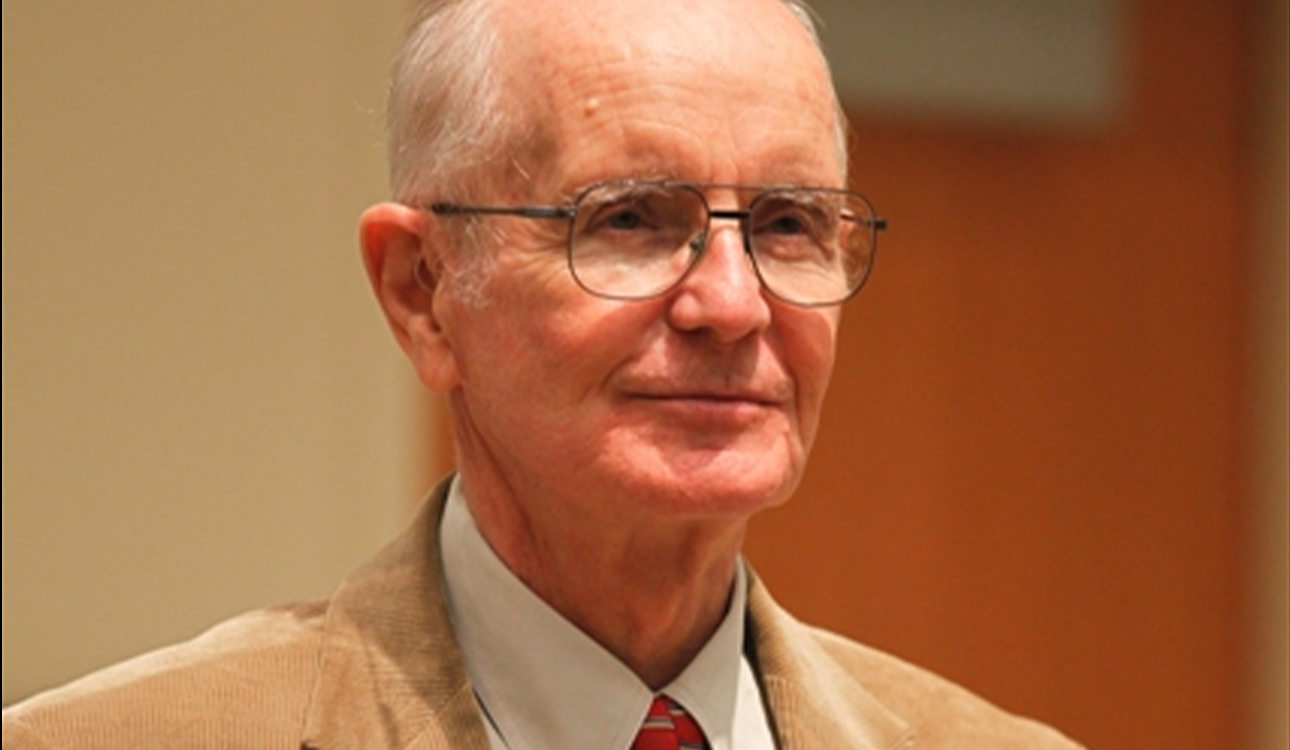
By Maegan Rocio
Staff Writer
Ranching and physics — an unlikely combination.
One Baylor researcher unites his two passions into a lifetime of work that has recently earned him a national award.
Dr. Marlan O. Scully, distinguished researcher at Baylor and member of the National Academy of Sciences, will receive the 2012 Frederic Ives Medal/Jarus Quinn Prize, the highest award given by the Optical Society of America, for his work in quantum optics.
The award is given in recognition of a lifetime of work in the optics field.
Scully will receive the award on Oct. 15 during the society’s annual conference in Rochester, N.Y. After accepting the medal, Scully will give his plenary speech “The Quantum Photocell: Efficiency via Quantum Coherence.”
Truell Hyde, vice provost of research and director of The Center for Astrophysics, Space Physics and Engineering Research (CASPER), said Scully is very deserving of the award.
“He has been the foremost quantum optics physicist in the world for a long time,” he said. “He is a renaissance man that is well-versed in other scholarly areas and has published works in all of them.”
Scully said he is receiving the award for his contributions in four topics in the field of quantum optics: the quantum theory of lasers, quantum coherence effects, quantum thermodynamics and quantum erasure.
The quantum theory of lasers is the fundamental description of laser behavior that connects with aspects of the natural world, such as condensation. Quantum coherence effects also involve lasers but focus on oscillating particles and using them for different purposes, such as freezing light and detecting small amounts of anthrax.
Quantum thermodynamics, studies heat and work, and figures out how they work within quantum systems.
Quantum erasure deals with erasing information about a particle’s predicted path while tracking the particle in an experiment.
Scully, who grew up on a ranch raising cattle in rural Wyoming, said he has earned the nickname The Quantum Cowboy because he uses physics in his life as a rancher.
“I’ve been raising cattle and that sort of thing all my life,” he said.
Scully said he became interested in the quantum optics field when he was a college student.
“The laser was just a new device when I was student, and we didn’t understand many of the aspects of laser behavior,” he said. “So my teacher, Willis Lamb, suggested that this would be a fruitful topic to study, and I worked with him on it, thus getting involved in the field.”
The late Willis Lamb was a famous American physicist who won the Nobel Peace Prize with his colleague, the late German-American Polykarp Kusch, for their discoveries concerning the structure of the hydrogen spectrum. Lamb was also a professor at Yale.
Scully said he believed he would be an engineer all his life due to working at a petroleum factory, but that changed when he attended community college.
“I attended Caster Community College, an excellent community college, then I went to the University of Wyoming,” he said. “I received a call from Rensselaer Polytechnic Institute. They told me I could skip the bachelor’s degree and start on my Ph.D. I went there as an employee, and after a year, even though I worked with General Electric, I found out Willis Lamb was coming to Yale. I went to Yale and did my Ph.D. with Lamb. I was hired by MIT on the faculty and have been a professor since. I have been a professor for 50 years.”
Kimberly Tappen, the associate director of the Institute of Quantum Science and Engineering at Texas A&M University, who works with Scully, said Scully applies his knowledge of quantum optics to his ranching lifestyle on the Brazos River.
“He uses lasers to determine the health of crops. When crops are under stress due to disease, sun, lack of water or insects, they tend to give off a chemical akin to aspirin,” and Scully uses a laser to detect it, Tappen said.
Tappen said Scully also uses his knowledge to care for his cattle on his ranch.
“He also uses lasers to determine the health of an animal for better wildlife management,” she said. “He can check their respiration rates, do tests on their fecal matter and determine if are they healthy.”
Scully has written around 800 published papers on quantum physics and other topics, and three books. One of his books, “The Demon and the Quantum,” was a collaboration with his son, Robert Scully.
Besides his work as a professor and scientific writer, Scully is also involved in 12 organizations and foundations that focus on quantum optics, including The Optical Society of America, the American Physical Society and the American Association for the Advancement of Science.
Tappen said Scully has been awarded with other distinctions by several science associations.
“He’s received many awards, honors and distinctions throughout his career. He has been elected to the National Academy of Sciences, American Academy of Arts and Sciences, Academia Europaea and Max Planck Society,” she said. “He’s also received numerous awards such as the Guggenheim Award, OSA/DPG Hebert Walther Award, APS Schawlow prize, OSA Townes Award (from The Optical Society), IEEE Quantum Electronics Award, Franklin Institute’s Elliott Cresson Medal, OSA Lomb Medal, and Humboldt Senior Faculty Prize. More recently he was named Harvard Loeb Lecturer, which is a high honor, and received an honorary doctorate from Universität Ulm.”
Universität Ulm is a public university located in Ulm, Germany.
Scully is also involved with eight other U.S. universities, including Yale, Texas A&M, the University of New Mexico and MIT.
Scully said he is thankful for the opportunity to work in the quantum physics field and do what he loves.
“Just going to school and getting an education, you can do that in our wonderful country. In others, you’d be locked in one career. I was fortunate to enjoy my profession and apply what I know about science to raising cattle and managing wildlife.”






